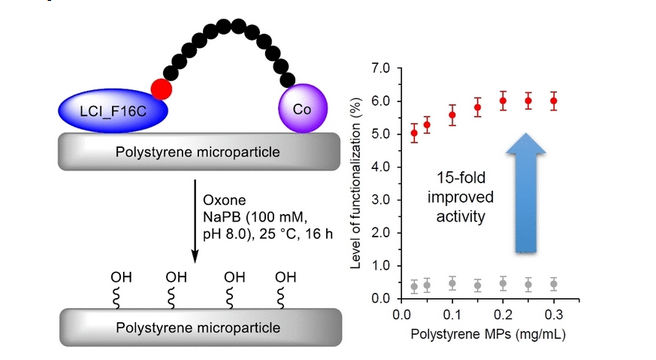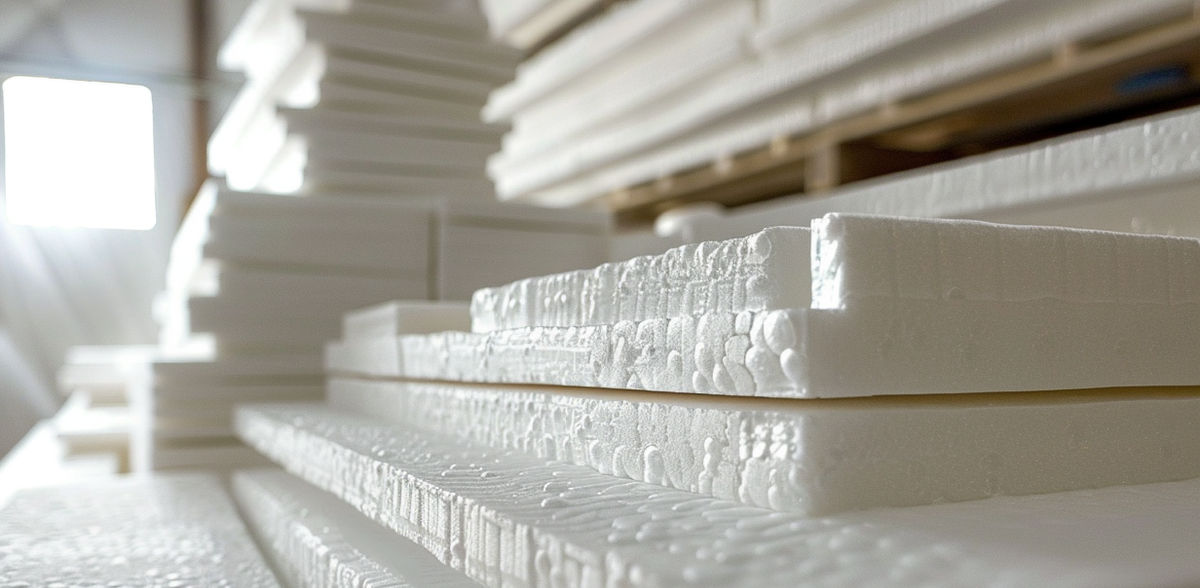Plastic Recycling with a Protein Anchor
Peptide with a cobalt complex oxidizes polystyrene microparticles
polystyrene is a widespread plastic that is essentially not recyclable when mixed with other materials and is not biodegradable. In the journal Angewandte Chemie, a German research team has introduced a biohybrid catalyst that oxidizes polystyrene microparticles to facilitate their subsequent degradation. The catalyst consists of a specially constructed “anchor peptide” that adheres to polystyrene surfaces and a cobalt complex that oxidizes polystyrene.

© Wiley-VCH
Polystyrene—alone or in combination with other polymers—has many applications, from yogurt containers to instrument housings. In its foam form, mainly known under the trademarked name Styrofoam, it is, for example, used for insulation and packaging. A big disadvantage of polystyrene is its poor biodegradability, which leads to environmental pollution. When clean and not mixed with other materials, polystyrene is recyclable, but not when it is contaminated, or combined with other materials. In municipal recycling programs, mixed polystyrene plastic waste and degradation products, such as polystyrene nano- and microparticles, are difficult to process. The problem lies in the fact that polystyrene is water-repellent and nonpolar and thus cannot react with common polar reactants.
For a simple, economical, and energy efficient process to break down mixed polystyrene waste, the polystyrene must first be equipped with polar functional groups. A team led by Ulrich Schwaneberg and Jun Okuda at the RWTH in Aachen (Germany) has now developed a novel biohybrid catalyst to carry out this step. The catalyst is based on compounds known as anchor peptides coupled with a cobalt complex.
Anchor peptides are short peptide chains than can attach to surfaces. The team developed a special anchor peptide (LCI, Liquid Chromatography Peak I) that binds to the surface of polystyrene. One gram of this peptide is enough to coat a surface of up to 654 m2 with a monolayer within minutes by either spraying or dipping.
A catalytically active cobalt complex is attached to the anchor peptide via a short linking piece. The cobalt atom is “surrounded” by a macrocyclic ligand, a ring made of eight carbon and four nitrogen atoms (TACD, 1,4,7,10-tetraazacyclododecane). The catalyst accelerates oxidation of the C–H bonds in polystyrene to form polar OH groups (hydroxylation) by reaction with Oxone (potassium peroxymonosulfate), a common oxidizing agent. The binding of the anchor peptides is material-specific so in this case they immobilize the catalytically active cobalt near the polystyrene surface, which accelerates the reaction. This simple, inexpensive, and energy-efficient process is scalable through dipping and spray applications and is suitable for use on an industrial scale.
Through the use of conjugated chemical catalysts, this hybrid catalyst concept employing material-specific binding by anchor peptides could allow for the material-specific breakdown of further hydrophobic polymers such as polypropylene and polyethylene that cannot be economically broken down by enzymes.
Original publication
Dong Wang, Aaron A. Ingram, Julian Luka, Maochao Mao, Leon Ahrens, Marian Bienstein, Thomas P. Spaniol, Ulrich Schwaneberg, Jun Okuda; "Engineered Anchor Peptide LCI with a Cobalt Cofactor Enhances Oxidation Efficiency of Polystyrene Microparticles"; Angewandte Chemie International Edition, 2024-2-19
Most read news
Original publication
Dong Wang, Aaron A. Ingram, Julian Luka, Maochao Mao, Leon Ahrens, Marian Bienstein, Thomas P. Spaniol, Ulrich Schwaneberg, Jun Okuda; "Engineered Anchor Peptide LCI with a Cobalt Cofactor Enhances Oxidation Efficiency of Polystyrene Microparticles"; Angewandte Chemie International Edition, 2024-2-19
Organizations
Other news from the department science

Get the chemical industry in your inbox
By submitting this form you agree that LUMITOS AG will send you the newsletter(s) selected above by email. Your data will not be passed on to third parties. Your data will be stored and processed in accordance with our data protection regulations. LUMITOS may contact you by email for the purpose of advertising or market and opinion surveys. You can revoke your consent at any time without giving reasons to LUMITOS AG, Ernst-Augustin-Str. 2, 12489 Berlin, Germany or by e-mail at revoke@lumitos.com with effect for the future. In addition, each email contains a link to unsubscribe from the corresponding newsletter.





























































